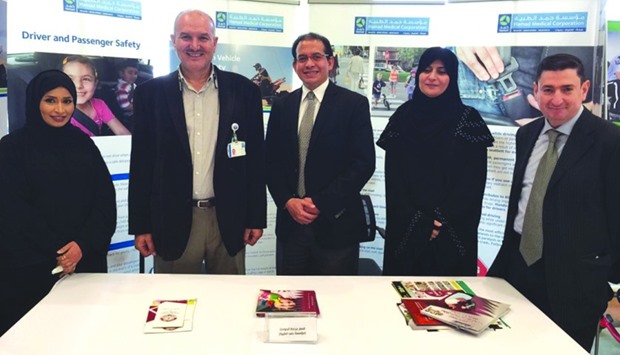The WDR is a global milestone event that was established by the UN Decade of Action for Road Safety 2011-2020 and its lead agency, the World Health Organisation. The theme for WDR 2016 is: “Vital Post-crash Actions: Medical Care, Investigation, Justice!”
Dr. Hassan al-Thani, head of Trauma Services in HMC’s Hamad Trauma Centre said, “We understand that some of our most important work must be done outside of the emergency and operating rooms of our trauma centre. Therefore, we will continue to strengthen our external partnerships and collaboration as we align our efforts to improve road safety in Qatar with those of the NTSC.”
Dr. Mohamed Ellabib, senior consultant, Trauma Surgery Section, Hamad Trauma Centre, gave examples of how the key elements of the trauma system work together to improve outcomes for victims.“Trauma systems span the full continuum of care, from emergency care and rehabilitation to prevention and research. Working in collaboration with the HMC Ambulance Service and HMC’s network of hospitals, including the Hamad General Hospital Level I Trauma Centre, the HMC Trauma System delivers a full range of highly specialised care to Qatar’s most severely injured patients."
At the event, Zvjezdana Zafa, corporate rehab services coordinator, physical medicine and rehabilitation, Rumailah Hospital, speaking on behalf of Dr. Wafa al-Yazeedi, acting chair, Department of Rehabilitation Medicine, Rumailah Hospital, highlighted the importance of rehabilitation in the post-crash phase. Bringing multiple disciplines together at this phase of the recovery process is about returning an injured person to good health and a productive life.
“Depending on the type and severity of the injury, an individual tailor-made rehabilitation programme is set, sometimes including home assessment and return to work rehabilitation. We also encourage traffic offenders to serve in rehab wards, as we believe it helps them improve their behaviour and safety on the roads in Qatar,” Zafa said.
Ali al-Shahrani and Rashed al-Hamaidi who were victims of motor vehicle accidents were present to share their experiences.They both echoed similar sentiments that excessive speeding was contributory to their involvement in crashes.They also stressed the important role of seatbelts in preventing injuries during accidents adding that being distracted by mobile phones, even for one second, might lead to permanent disability or death.

HMC highlighted role of national trauma system at the World Day of Remembrance
Hamad Medical Corporation (HMC), in collaboration with the National Traffic Safety Committee at the Traffic Department, Ministry of Interior and other key stakeholders for road safety, commemorated the World Day of Remembrance (WDR) for victims of road traffic injuries by hosting an event for staff.
